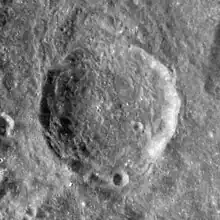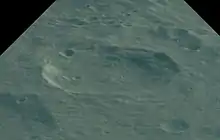 Apollo 17 Mapping Camera image | |
| Coordinates | 9°30′S 132°00′E / 9.5°S 132.0°E |
|---|---|
| Diameter | 55 km |
| Depth | Unknown |
| Colongitude | 84° at sunrise |
| Eponym | Jonathan H. Lane |

Oblique view from Apollo 13
Lane is a lunar impact crater. It lies on the far side of the Moon, just to the west of the crater Ten Bruggencate. To the west of Lane is Perepelkin, and to the northwest lies Love.
This crater is not heavily eroded, but the rim is somewhat disrupted at the northern and southern ends. To the south the rim has a prominent outward bulge that extends an extra 5–10 km. The interior is somewhat uneven, with low central ridges near the midpoint.
The crater was named after American astrophysicist Jonathan Homer Lane by the IAU in 1970.[1] The crater was known as Crater 287 prior to naming.[2]
Satellite craters
By convention these features are identified on lunar maps by placing the letter on the side of the crater midpoint that is closest to Lane.
| Lane | Latitude | Longitude | Diameter |
|---|---|---|---|
| B | 7.5° S | 132.9° E | 13 km |
| S | 9.7° S | 130.7° E | 35 km |
References
- ↑ Lane, Gazetteer of Planetary Nomenclature, International Astronomical Union (IAU) Working Group for Planetary System Nomenclature (WGPSN)
- ↑ Lunar Farside Chart (LFC-1A)
- Andersson, L. E.; Whitaker, E. A. (1982). NASA Catalogue of Lunar Nomenclature. NASA RP-1097.
- Bussey, B.; Spudis, P. (2004). The Clementine Atlas of the Moon. New York: Cambridge University Press. ISBN 978-0-521-81528-4.
- Cocks, Elijah E.; Cocks, Josiah C. (1995). Who's Who on the Moon: A Biographical Dictionary of Lunar Nomenclature. Tudor Publishers. ISBN 978-0-936389-27-1.
- McDowell, Jonathan (July 15, 2007). "Lunar Nomenclature". Jonathan's Space Report. Retrieved 2007-10-24.
- Menzel, D. H.; Minnaert, M.; Levin, B.; Dollfus, A.; Bell, B. (1971). "Report on Lunar Nomenclature by the Working Group of Commission 17 of the IAU". Space Science Reviews. 12 (2): 136–186. Bibcode:1971SSRv...12..136M. doi:10.1007/BF00171763. S2CID 122125855.
- Moore, Patrick (2001). On the Moon. Sterling Publishing Co. ISBN 978-0-304-35469-6.
- Price, Fred W. (1988). The Moon Observer's Handbook. Cambridge University Press. ISBN 978-0-521-33500-3.
- Rükl, Antonín (1990). Atlas of the Moon. Kalmbach Books. ISBN 978-0-913135-17-4.
- Webb, Rev. T. W. (1962). Celestial Objects for Common Telescopes (6th revised ed.). Dover. ISBN 978-0-486-20917-3.
- Whitaker, Ewen A. (1999). Mapping and Naming the Moon. Cambridge University Press. ISBN 978-0-521-62248-6.
- Wlasuk, Peter T. (2000). Observing the Moon. Springer. ISBN 978-1-85233-193-1.
External links
Wikimedia Commons has media related to Lane (lunar crater).
This article is issued from Wikipedia. The text is licensed under Creative Commons - Attribution - Sharealike. Additional terms may apply for the media files.